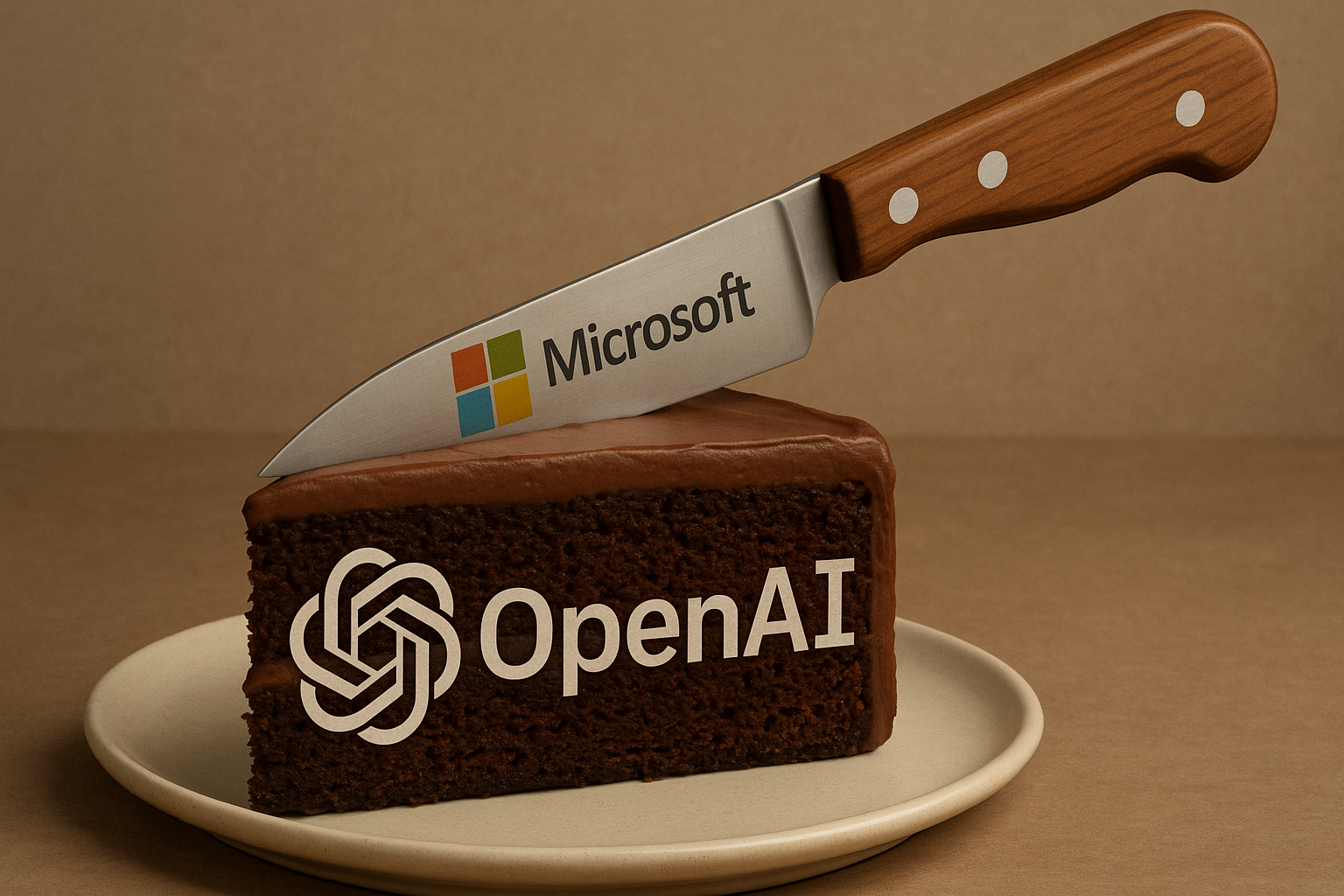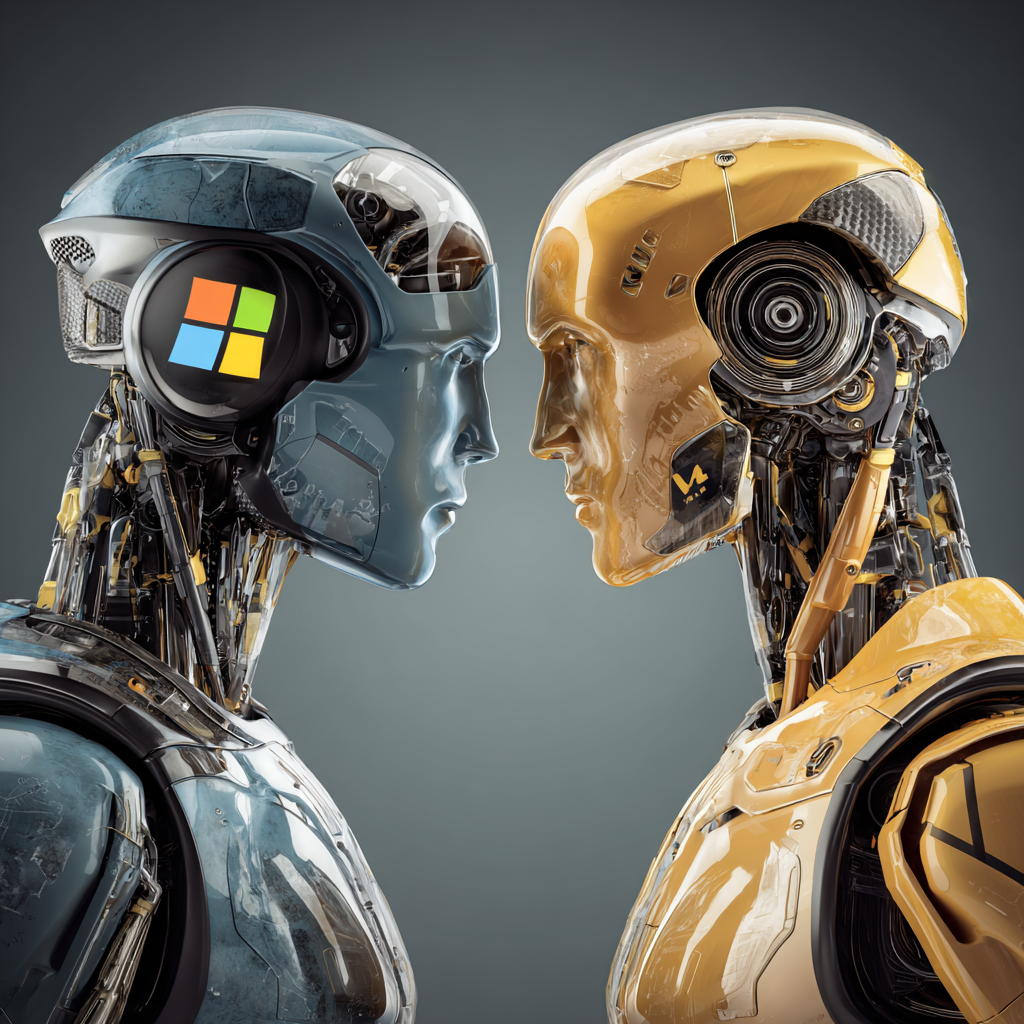OpenAI Gets Their Cake and Microsoft Gets Their Stake

Looks like an IPO is back on the menu boys! Actually, probably a number of mysterious "new ideas" for financing well before that happens. Because lord knows that OpenAI will need it. At this point, it's clear that hundreds of billions – if not trillions – will be needed to push the company to AGI (or bust). And now they have a much cleaner path towards at least those financing goals because guess what? There is now actual equity for sale. Not just the nebulous promise of future profits.
Yes, OpenAI is finally converting into a for-profit. Well, sort of. Technically, a Public Benefit Corporation (PBC) that is still actually controlled by a non-profit – now called the "OpenAI Foundation". It's not exactly the structure that OpenAI wanted, but it's the one that works. At least for the states that have to sign off here. And Microsoft.
Speaking of, following the strange announcement of an agreement to agree to an agreement a few weeks back, today Microsoft is back with a far longer post on the matter. The key framing is clearly to let the world know that they signed off on this new structure. And for as vague as all the numbers surrounding OpenAI and Microsoft have been to date, they're very specific here:
First, Microsoft supports the OpenAI board moving forward with formation of a public benefit corporation (PBC) and recapitalization. Following the recapitalization, Microsoft holds an investment in OpenAI Group PBC valued at approximately $135 billion, representing roughly 27 percent on an as-converted diluted basis, inclusive of all owners – employees, investors, and the OpenAI Foundation. Excluding the impact of OpenAI’s recent funding rounds, Microsoft held a 32.5 percent stake on an as-converted basis in the OpenAI for-profit.
That last bit is particularly amusing. I assume it's in there just to let everyone (and their shareholders) know that they were going to get that rumored 33% stake, but the most recent crazy amounts of money coming into OpenAI diluted it down to "roughly 27 percent". Thank you for the clarification there, Microsoft.
Actually, I really do appreciate it because it proves that my guesstimate from just over a year ago was, well, spot-on. Specifically, I tried to back into a would-be cap table for OpenAI upon conversion into a for-profit. While Microsoft technically had the aforementioned rights to 49% of OpenAI's profits (after a 75% share of those profits until they recouped their investments), it simply didn't seem reasonable or tenable that this would translate 1-to-1 into equity.
And it's quite possible that Microsoft wouldn't even want such high ownership – which sounds weird, until you consider the regulatory pressure they'd be under owning just about half of the world's most important AI company. It's the same strange situation that caused them to step back from their board observer role (after Apple perhaps forced their hand in trying to negotiate their own stake in OpenAI – one which they backed away from at the last minute).
Anyway, in simply trying to think through a reasonable equity stake for Microsoft given their $13B or so in early commitments which not only kept OpenAI afloat (after their main benefactor up until that point, co-founder Elon Musk, turned his back on and his wallet off for them) but allowed them to thrive with Big Tech compute power for a then-small startup. And, of course, what Microsoft might think is a meaningful stake for that backing, since they would have to sign off on any conversion. So 33% seemed like the sweet spot, and it was.
It's also, I should note. A larger stake than almost any VC owns in any company from an early round of financing. And certainly a lot more than any VC owns in any AI company. This ended up being a fantastic deal for Microsoft from a pure investment perspective – at least so far. And that's why it was always especially wild to me that Microsoft kept trying to distance themselves from OpenAI. I get that they felt burned by the Sam Altman coup (and specifically the fact that it happened without a heads up), but this deal will go down as a textbook example, I suspect quite literally, of how a multi-trillion dollar company under intense regulatory scrutiny could essentially co-develop the next most important industry by doing it at arms-length with a non-controlled startup.
Does anyone think Microsoft could have developed AI in-house by themselves? Even if they could overcome all the usual Innovator's Dilemma issues, there would have been too much regulatory pressure (certainly before the Trump administration came into power). Just look at Google. Which had all the pieces in place – and, in fact, had all of the key inventors of what underpins LLMs in house – and they still fumbled the bag out of the gate. It's not hard to see why, and the same issues would have fallen on Microsoft, which, honestly, wouldn't have even gotten that far. Both Google and Microsoft are now are where they are with their own internal projects because OpenAI cleared (and showed) the way forward. And Microsoft made that possible! And so now they own a stake worth "approximately $135B" as a result. And if OpenAI really does achieve AGI, it could be worth trillions. It could be worth more than Microsoft one day!
That sounds hyperbolic, and it probably will be. But there's at least a chance that it isn't. And this conversion gives that chance substantially better odds.
Anyway, OpenAI's blog post on the matter is largely about how well capitalized the non-profit will be under this new structure, with that stake worth "approximately $130 billion" (which seems purposefully set up to be just below Microsoft's stake – unless it's the exact same and they just didn't coordinate on their talking points!?), and a $25B initial commitment of capital. In fact, the post doesn't even mention Microsoft! And that's hardly surprising since once they got Microsoft to sign off, the real case they had to make was to California (where OpenAI operates) and Delaware (where OpenAI is incorporated) to make sure their AGs signed off on this new structure. And they're not in the business of protecting Microsoft, they're all about protecting the non-profit and tangentially, the tax-payers of their states.
But Microsoft's blog post has the real deal meat. Beyond the above, we have actually quite clear bullet points! All around the following notion:
The agreement preserves key elements that have fueled this successful partnership – meaning OpenAI remains Microsoft’s frontier model partner and Microsoft continues to have exclusive IP rights and Azure API exclusivity until Artificial General Intelligence (AGI).
It also refines and adds new provisions that enable each company to independently continue advancing innovation and growth.
To quickly take the points one-by-one:
- Once AGI is declared by OpenAI, that declaration will now be verified by an independent expert panel.
Before, OpenAI's board had the right to make such a declaration (in consultation with Microsoft). Which obviously was a huge conflict of interest. How an "independent expert panel" will be able to define AGI when the rest of the world – including all of these companies – cannot definitely still feels like a problem. But there's at least better structure around the decision now. Who is on this panel?
- Microsoft’s IP rights for both models and products are extended through 2032 and now include models post-AGI, with appropriate safety guardrails.
This is a two-year extension from the prior deal and negates the AGI clause that severed such ties if and when AGI was declared. That's a big win for Microsoft, obviously.
- Microsoft’s IP rights to research, defined as the confidential methods used in the development of models and systems, will remain until either the expert panel verifies AGI or through 2030, whichever is first. Research IP includes, for example, models intended for internal deployment or research only. Beyond that research IP does not include model architecture, model weights, inference code, finetuning code, and any IP related to data center hardware and software; and Microsoft retains these non-Research IP rights.
This is more of a behind-the-scenes element of the above. Basically, while Microsoft can still use the models and products through 2032, their visibility into exactly "how the sausage is made" still ends in 2030 (or when the above expert panel declares AGI). But the "exactly" caveat is also key because Microsoft will still have some extended rights here with model weights, for example. OpenAI simply better protects their "research IP" for the long term with this.
- Microsoft’s IP rights now exclude OpenAI’s consumer hardware.
Jony Ive and his io team say "thank you" for this one. As they can now work on their "anti iPhone" (not a phone, but a device that they hope will lessen the addiction to smartphones) in peace.
- OpenAI can now jointly develop some products with third parties. API products developed with third parties will be exclusive to Azure. Non-API products may be served on any cloud provider.
This is a nice win for OpenAI, getting more flexibility to partner with others on products – but any APIs they build will still have to flow through Azure, so Microsoft continues to get some benefit in that scenario.
- Microsoft can now independently pursue AGI alone or in partnership with third parties.
And this is key for Microsoft's own AI team, which has spent months and months framing it as if they were happy to let OpenAI do all the heavy lifting while they did smaller stuff – when really, they just weren't allowed to work towards AGI under the previous agreement. Now they can.
- If Microsoft uses OpenAI’s IP to develop AGI, prior to AGI being declared, the models will be subject to compute thresholds; those thresholds are significantly larger than the size of systems used to train leading models today.
It would be sort of wild if Microsoft gets to AGI first – and does so thanks in part to OpenAI's IP. This is trying to cover that situation, which seems like it will still be a massive issue if that happens. Especially now that Microsoft would be unnaturally compute constrained by OpenAI in that situation?! Anyway, it's obviously unlikely. But Microsoft's AI group will be trying to go for it, clearly!
- The revenue share agreement remains until the expert panel verifies AGI, though payments will be made over a longer period of time.
This seems like a way to lower the upfront revenue hit that OpenAI has to give back to Microsoft, which is what OpenAI has been aiming for and modeling in their internal documents (this percentage going down over time). Still, it's a win for Microsoft that it's remaining in any capacity.
- OpenAI has contracted to purchase an incremental $250B of Azure services, and Microsoft will no longer have a right of first refusal to be OpenAI’s compute provider.
What's $250B more in commits when trillions are being thrown out there? It's a small price to pay in theoretical money to remove the ROFR on every single cloud/data center deal OpenAI strikes...
- OpenAI can now provide API access to US government national security customers, regardless of the cloud provider.
This helps both OpenAI and the US government, obviously, as Microsoft is no longer a bottleneck for deals. Though it's interesting that they specifically call out "API access" which is also obviously the thing Microsoft is protecting most dearly in the other points above. So I guess this is a clear carve-out.
- OpenAI is now able to release open weight models that meet requisite capability criteria.
Something which, of course, OpenAI has already started doing recently. This alleviates any tension with Microsoft worried they're giving away IP that should belong to (or be protected by) Microsoft, it seems.
So yeah, there's a lot in there. And, you have to suspect, even more finer details that the companies aren't sharing, but will undoubtedly get reported on over time. It's no wonder the two sides took forever to hammer this out, and now they can finally play nicely again. At least until tensions inevitably arise around the margins of all of the above points. Which will obviously keep happening.
But that's for another day. For now, we welcome Microsoft as the newest Big Tech player with an official massive equity stake owner in Big AI. OpenAI and Microsoft are so back.
One more thing: Re-reading my post on the bizarre pre-announcements from Microsoft and OpenAI six weeks ago, I think I nailed this all pretty well, actually (if you'll forgive the long excerpt):
Alleviating the Microsoft portion of this situation is an important step, but not the only one here. But it should help the company continue to make the case for the PBC transition, which they had hoped would happen this year, but reportedly was pushed into next year because of the impasse with Microsoft. Again, that impasse is now being cleared – well, they're working on it. To me, that suggests OpenAI is very much trying to make this happen this year still.
And yes, contractually they're incentivized to do this because as has been widely reported, OpenAI's new big benefactor, SoftBank, had the right not to fund the remainder of their portion of the $40B fundraise if the company didn't transition by the end of the year. Now there's almost no way SoftBank was going to back out of that agreement regardless – I mean, they're buying up secondary shares right now at $500B, which is significantly higher than the shares they're buying in the primary transaction. They'd be crazy not to take the automatic markup of their money which they can still invest at $300B!
But we're too in the weeds now. The key is that solving this Microsoft situation was perhaps the main element in trying to get a transition done any time soon. And even without the SoftBank deal pressure, the pressure from those states is now far more acute. One imagines that OpenAI wants to get this done quickly before they're sucked into endless political hearings about AI's role in the mental health crisis – which is clearly about to happen.
If that's true, one has to wonder what OpenAI conceded to Microsoft here to get them on board, fast. Again, they're not saying because they're still negotiating, but clearly a big part of it is "The Clause". That is, the stipulation in the original contract that Microsoft would lose access to OpenAI's technology if the company achieved AGI. It's decidedly more complicated than that, including in the who gets to decide what constitutes "AGI" (namely OpenAI's board, which is now a totally different board, composed of people will completely different backgrounds, than the one that was supposed to be determining it), and if Microsoft retained access to "older" AI technology, but the high-level was clearly a problem for Microsoft.
And it keeps coming up because Sam Altman on down has kept hinting that the company may be close to achieving "AGI". It was clearly pissing off Satya Nadella, who made that more or less known, and so talk suddenly shifted to "superintelligence", which is totally different, you see.
At the same time, a lesser known part of "The Clause" apparently also blocked Microsoft itself from going after AGI. This undoubtedly didn't matter to the company at the time of the agreement, but since then – well, things have changed. Including "the blip" – the brief moment in time when Altman was ousted from OpenAI, only to be quickly reinstated with the help of Nadella – which torpedoed the trust between the two sides and led to Microsoft inventing the "hackquisition" process (born out of the way they almost hired all of OpenAI during said blip) to take on Inflection AI talent and bring DeepMind co-founder Mustafa Suleyman on board to lead new AI efforts internal to Microsoft.
As for my guess as to what would happen:
"The Clause" "remains" but, it's modified. And my guess would be that it's modified such that Microsoft is also now free to pursue AGI and/or superintelligence, and anything else they wish to call it. I'm also guessing they'll also retain some form of access to OpenAI's technologies beyond 2030 – the other aspect of the contract Microsoft had reportedly wanted to change. Again, Microsoft seemingly holds the cards here with the sign-off sword in hand and with all the other issues swirling around OpenAI...
All in exchange for a 33% stake. Now a "roughly" 27% stake.












